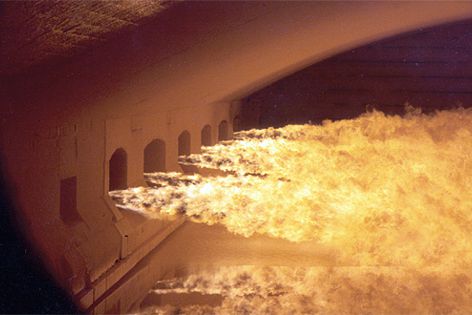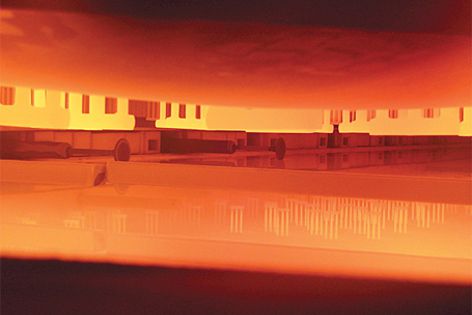Architecture Media’s editorial team recently took a fascinating trip to the Viridian complex at Dandenong in suburban Melbourne. Viridian marketing manager Cameron Hook organized the 90-minute plant tour, led by glassmaking manager Dave Thredgold.
We commenced our journey with a lengthy safety briefing, before progressing through the front-of-house area to the raw materials storage area – the batch house. There, the materials are weighed and mixed to specific formulas for particular types of glass, before being transported via conveyor belt to the furnace.
Heated to 1,600ºC, the gas-powered furnace fires from alternate sides of the structure every 20 minutes. This process can last up to 50 hours while the molten material is on the move. At this point, the river of glass – the float bath – is slowly cooled from 1,100ºC to 700ºC. The maximum width of the glass is a staggering 3,680 mm.
Thredgold explained that the glass spreads itself across the base of the furnace, where a layer of tin keeps it flat and parallel. Workers in the state-of-the-art control room manage a carefully controlled atmosphere of nitrogen and hydrogen minute by minute, to prevent the tin from oxidizing.
As the float bath never stops, moving 24/7 all year round, the control room constantly troubleshoots potential problems.
As the glass river nears the end of this process, the next step, if required, is to coat the glass while still in a semi-molten state. Coatings can change the glass’s optical properties to produce energy-efficient, high-performance products. To achieve this, a gaseous chemical mixture is brought in contact with the glass and a pyrolytic reaction impregnates the sheets.
Following coating, a controlled cooling period commences, in which the glass temperature is slowly lowered from 600ºC to room temperature.
The last step is to cut the glass sheets, which are then stored in the dispatch area ready to be loaded onto special container trucks that distribute the orders.
Viridian’s processes have been so highly refined that the company now leads the world in product quality.

